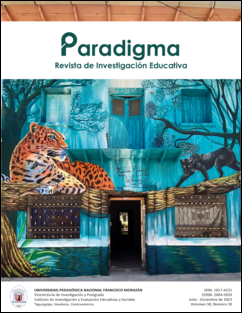Percepciones del Alumnado sobre sus Experiencias de Enseñanza y Aprendizaje en la Modalidad Virtual en el Marco de la Covid 19
DOI:
https://doi.org/10.5377/paradigma.v30i50.17096Palabras clave:
aprendizaje virtual, aprendizaje en línea, pandemia, motivación al aprendizajeResumen
La pandemia ocasionada por el coronavirus ha derivado en que los sistemas de educación en general, y el universitario en particular, migraran a una modalidad de educación virtual, que si bien es cierto se venía implementado en los contextos universitarios, su difusión y acercamiento quedaban aún muy reducidos. En tal sentido, esta investigación tiene como objetivo conocer las valoraciones que el alumnado de cinco carreras de formación docente tiene sobre su experiencia formativa en esta modalidad, a partir de tres categorías: la enseñanza, el aprendizaje y la motivación. Se adoptó el enfoque cualitativo a través de la implementación del método fenomenológico, con una muestra intencional de 35 estudiantes, a quienes se les administró una entrevista cualitativa semiestructurada en formato digital. El análisis de los datos se realizó aplicando los principios y procedimientos propios del análisis de datos cualitativos: organización, codificación e interpretación de las narrativas. En conclusión, como parte de sus propias vivencias, los estudiantes reconocen tanto aspectos positivos, como aspectos por mejorar en lo que respecta a su aprendizaje, a la enseñanza y a su estado motivacional.
Descargas
318
Descargas
Publicado
Cómo citar
Número
Sección
Licencia
Derechos de autor 2023 Universidad Pedagógica Nacional Francisco Morazán

Esta obra está bajo una licencia internacional Creative Commons Atribución-NoComercial-SinDerivadas 4.0.
Cesión de Derechos de Autor
- El autor o autora, al enviar el trabajo, manifiesta que es su voluntad ceder a la Universidad Pedagógica Nacional Francisco Morazán los derechos patrimoniales que le corresponden como autor de su trabajo.
- Los derechos aquí cedidos comprenden todos los derechos patrimoniales (Reproducción, transformación, comunicación pública y distribución) y se dan sin limitación alguna en cuanto a territorio se refiere; esta Cesión se da por todo el término de duración establecido en la legislación vigente en Honduras.
- La cesión de los derechos antes mencionada no implica la cesión de los derechos morales sobre la misma, porque de conformidad con lo establecido en la Ley de Derechos de Autor y Derechos Conexos, Capítulo II, de los Derechos Morales, Artículo 34, Artículo 25, estos derechos son irrenunciables, imprescriptibles, inembargables e inalienables.
- El trabajo de investigación o documento debe ser original y haber sido realizado sin violar o usurpar derechos de terceros, por lo tanto, la obra es de autoría exclusiva y posee la titularidad de la misma.
- En caso de presentarse cualquier reclamación o acción por parte de un tercero, en cuanto a los derechos de autor sobre la obra en cuestión, el autor deberá asumir toda la responsabilidad sobre los derechos cedidos.
- Al completar el Formato de Cesión de Derechos el autor manifiesta que el trabajo no ha sido publicado en otro medio, que los derechos sobre el trabajo no han sido cedidos y que sobre ellos no pesa ningún gravamen ni limitación en su uso o utilización.





